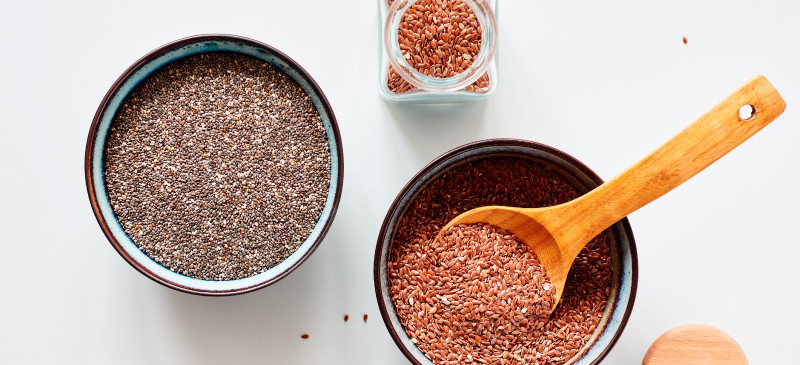This Dr. Axe content is medically reviewed or fact checked to ensure factually accurate information.
With strict editorial sourcing guidelines, we only link to academic research institutions, reputable media sites and, when research is available, medically peer-reviewed studies. Note that the numbers in parentheses (1, 2, etc.) are clickable links to these studies.
The information in our articles is NOT intended to replace a one-on-one relationship with a qualified health care professional and is not intended as medical advice.
This article is based on scientific evidence, written by experts and fact checked by our trained editorial staff. Note that the numbers in parentheses (1, 2, etc.) are clickable links to medically peer-reviewed studies.
Our team includes licensed nutritionists and dietitians, certified health education specialists, as well as certified strength and conditioning specialists, personal trainers and corrective exercise specialists. Our team aims to be not only thorough with its research, but also objective and unbiased.
The information in our articles is NOT intended to replace a one-on-one relationship with a qualified health care professional and is not intended as medical advice.
16 Natural Laxatives to Make You ‘Regular’
April 19, 2024

Constipation is one of the most commonly reported health problems, affecting about 16 percent of U.S. adults and one in three adults over age 60, according to the National Institutes of Health. What helps relieve constipation fast? While a number of over-the-counter medications are available to treat this condition quickly, not all are considered safe. Instead, there are also natural laxatives that can work equally well for some people.
Natural laxatives, in the form of certain foods, beverages and herbs, have been used for wellness purposes to alleviate constipation for over 2,000 years. Meanwhile, they’re now being touted as a remedy for even “toxic poop.”
People have always known that bowel movements are necessary for good health, but in today’s fast-paced society, a poor diet, stress or frequent traveling can get in the way of you and good digestion.
Who Can Benefit From Natural Laxatives?
Today, there are dozens of different laxatives available on the market to help those who frequently get constipated — everything from herbal teas and detox tinctures to pills and enemas. Technically, there are several types of laxatives that work in various ways, which include stimulant agents, saline and osmotic products, bulking agents, and surfactants.
However, natural laxatives (such as plain water) will often get the job done, without many of the unpleasant side effects that over-the-counter laxatives can cause.
It’s important to realize that while OTC or prescription laxatives might help solve constipation symptoms in the short term, they ultimately don’t fix any underlying digestive issues. In fact, they can make the problem even worse. They may cause unwanted and dangerous side effects — and even become addictive since the body begins to rely on them over time to function properly.
Our bodies have an amazing natural ability to cleanse and detox on their own — we just need to provide the correct nutrients and hydrating fluids.
Short-term or chronic constipation can occur for many different reasons, including:
- eating a diet that lacks of both insoluble fiber and soluble fiber
- dehydration
- stress
- lack of sleep
What’s considered “normal” when it comes to pooping? Most experts agree that it’s important to go to the bathroom at least three or more times per week at a minimum, and ideally daily. However, the number of bowel movements someone should have each day/week varies from person to person, so there is not one specific number that is considered completely “normal” and healthy.
The bottom line is that if you’re currently not going at least this amount, making changes to your diet and lifestyle first (for example, eating more fiber, exercising and reducing stress) is crucial to solving the problem long term.
Best Natural Laxatives
Do certain foods make you poop right away? No, for most foods that promote regular bowel movements don’t work immediately — rather they help keep you “regular” long term.
Here are the best natural laxatives to get into your daily, or at least weekly, diet:
1. Fiber
Most adults, and children too, could afford to eat more fiber. While increasing intake of high-fiber foods alone might not solve all cases of constipation, it’s definitely one of the first steps to take.
In fact, a meta-analysis published in the World Journal of Gastroenterology concluded, “Dietary fiber intake can obviously increase stool frequency in patients with constipation.”
What’s considered a high-fiber diet? Make sure you aim to get between 25–40 grams of fiber per day.
Adult men/larger individuals need a higher amount than women and smaller individuals. You always want to get your fiber from natural sources (unprocessed, whole foods) whenever possible, as opposed to artificially created fibers found in processed “high-fiber” bars, shakes, etc.
High-fiber fruits and vegetables include:
- Avocados
- Asian pears
- Berries
- Figs
- Peas
- Okra
- Brussels sprouts
2. Water
The benefits of drinking water are legendary but often overlooked. Your kidneys and liver require water to clean your blood, produce urine and, yes, help your body to get rid of waste.
When you drink water, you’re less likely to deal with constipation and diarrhea, which can be worsened in some cases by dehydration. Up your water intake in order to “keep things moving” and help you stay regular. The Institute of Medicine recommends between nine and 13 cups per day for adults.
3. Probiotic Foods
Probiotics are “good bacteria” in your gut that are able to balance various types of “bad bacteria.” They help create a healthy environment in your gut “microflora” and can help keep you free of digestive problems, including constipation or diarrhea.
Probiotic foods includes kefir, kombucha, sauerkraut, kimchi and probiotic yogurt.
Just make sure that when buying dairy products, you always choose organic products, as they are easier on digestion, such as goat milk products, organic kefir, raw dairy products or dairy that doesn’t contain A1 casein. It’s possible that low-quality pasteurized/homogenized dairy, or too much dairy in general (especially if someone has symptoms of lactose intolerance), can cause inflammation and contribute to digestive dysfunction.
4. Aloe Vera
What is the best laxative that works fast? Some would say aloe vera juice, which is one of the oldest and well-researched natural laxatives there is.
Sometimes called aloe “latex,” this substance comes packed with enzymes, vitamins, minerals and electrolytes that help soften stools and aid the gut. For example, anthraquinones are a type of compound present in aloe that act like a laxative by increasing intestinal water content, stimulating mucus secretion and increasing intestinal peristalsis naturally (contractions that break down food).
Aloe vera latex also has anti-inflammatory components that reduce swelling and and improve function of the digestive organs, making it easier to pass bowel movements. Some of the other benefits of aloe vera are its ability to help normalize acid/alkaline and pH balance, lessen yeast formation, and encourage the growth of good digestive bacteria.
For constipation, take 100–200 milligrams of aloe vera daily.
5. Chia Seeds
One of the benefits of chia seeds is its ability to absorb water in the gastrointestinal tract and, therefore, work as a natural laxative.
Chia seeds provide 10 grams of fiber per one-ounce serving. They combine with liquid to form a gelatinous substance that easily moves through your intestines.
As a great way to increase the fiber in your diet, chia seeds swell and expand in the digestive tract, absorbing fluids. They’re best for constipation when you also increase your fluid intake, helping them move through the gut easily.
Consume between one and three tablespoons per day.
To get the most nutrients out of your food and to maximize the potential benefits of chia seeds, try soaking them before adding them to a recipe or smoothie. Place them in a 1:10 ratio of chia to water, and let them sit for between 30 minutes to two hours. This equates to about one and a half tablespoons of chia seeds in one cup of water.
6. Flaxseeds
Flaxseeds are an excellent source of fiber, which adds bulk to your stool and helps it pass through your intestines. They provide about three grams of fiber per tablespoon. As an added bonus, flaxseeds work to treat both constipation and diarrhea, according to research studies.
They’re practically tasteless, and one of the benefits of flaxseeds is they’re easy to use in recipes you already make, like oats, baked goods and smoothies.
To reap the most health benefits, experts usually recommend ground flaxseeds instead of whole flaxseeds. Consume two to three tablespoons per day.
Just remember that whenever you eat a lot of fiber, you want to also make sure to drink plenty of water, too — since a high amount of fiber without enough hydrating liquids can actually result in even more bathroom troubles!
7. Leafy Green Veggies
What’s one of the best natural laxatives to lose weight? Leafy greens. Not only a great source of fiber, leafy greens like spinach and kale also provide plenty of magnesium. Magnesium is an electrolyte in leafy greens that has the natural ability to safely soften stool and help draw in water from your gut.
Without enough magnesium, it’s hard for stool to easily move through your system, especially since magnesium is a natural muscle relaxer, which can help stop cramping in the abdomen. If you notice that increasing magnesium-rich foods results in your stools becoming too loose and watery, you can adjust your intake until its comfortable and back to normal.
8. Psyllium Husk
For those with bad constipation, additional fiber intake in the form of psyllium is recommended by scientific studies over magnesium-based laxatives, which should be avoided due to potential toxicity.
When combined with water or another liquid, psyllium husk swells and produces more bulk, which stimulates the intestines to contract and helps speed the passage of stool through the digestive tract. Psyllium has also been found to be superior to docusate sodium for softening stools by increasing stool water content and has greater overall laxative efficacy.
For adults and children over 12 years of age, take one teaspoon of psyllium husk powder mixed into a liquid of your choice one to three times daily.
9. Coconut Water
Coconut water is good for you for many reasons — not only does it taste great as an alternative to plain old water or sugary drinks, but it also helps with maintaining healthy electrolyte levels, preventing dehydration and clearing out your urinary tract.
For centuries, coconut water has been used for a natural hydration boost due to its high electrolyte content, especially potassium (which it provides 12 percent of your daily value of in every one-cup serving). Because it tastes great, it’s one of the best natural laxatives for kids and a natural electrolyte drink.
In fact, coconut water can be so healing for constipation that some people find drinking too much loosens stools to an uncomfortable level, so start slow.
10. Senna Tea
Senna leaf, fruit and pods have been used in tea form as a purgative or natural laxative for centuries. Senna tea is approved by the FDA as a nonprescription laxative.
How can it help? Senna has been shown in controlled trials to soften stools while also increasing stool frequency and weight.
How long does it take for a senna laxative to work? On average, it takes about eight hours, but it can commonly take anywhere between six and 12 hours. A common recommendation is to have senna tea before bedtime to have constipation relief the next morning.
The most common potential side effects are gastrointestinal upset, but these can often be avoided by not taking more than a recommended dose and not using any senna product for longer than a week at a time.
11. Prune Juice
We couldn’t consider this a complete list without this old classic. Prune juice has long been regarded as an effective fighter against constipation, especially in the elderly population. The Cleveland Clinic recommends drinking prune juice as part of a constipation-prevention diet.
Findings from double-blind, randomized, placebo-controlled trial among Japanese subjects published in 2022 determined that:
“Prune intake significantly decreased hard and lumpy stools while increasing normal stool and not increasing loose and watery stools. Prune intake also ameliorated subjective complaints of constipation and hard stools, without alteration of flatulence, diarrhea, loose stools, or urgent need for defecation. There were no adverse events or laboratory abnormalities of liver or renal function after prune intake.”
The study authors ultimately concluded: “Prune juice exerted an effective and safe natural food therapy for chronic constipation.”
At least one reason for this improvement involves the fiber in prune juice. This insoluble fiber fuels the healthy bacteria in your digestive system responsible for digestive health.
12. Slippery Elm
Although it works differently than some other laxatives, it seems to improve symptoms of constipation, IBD and IBS, including in both adults and children. The fresh inner bark can be used in place of, or along with, other natural laxatives.
In one study, the effects of two different formulas on digestive function were compared, both of which included slippery elm in addition to other herbs.
Formula one was associated with a small but significant increase in bowel movement frequency, as well as reductions in straining, abdominal pain, bloated stomach and IBS symptoms. Subjects who took formula two experienced a 20 percent increase in bowel movement frequency and significant reductions in straining, abdominal pain, bloating and global IBS symptom severity, as well as improvements in stool consistency. Ultimately, both formulas led to improvements.
13. Mineral Oil
When taken internally (and therefore considered an over-the-counter drug), mineral oil can help treat constipation due to its laxative effects. A study examined its use and confirmed that mineral oil was essentially inert, “with no systemic effects in humans when taken orally, other than a lubricating laxative effect in the gastrointestinal tract.”
It works to alleviate constipation by retaining water in stool and the intestines, lubricating the bowels, and making it easier to pass a bowel movement without straining.
For laxative purposes, it can be taken orally (my mouth) or used as an enema. When inserted as an enema, most of the oil will actually be excreted in the stool once someone goes to the bathroom.
14. Castor Oil
Castor oil works like a natural, mild stimulant laxative when taken orally. Castor oil can provide constipation relief, reduce straining during defecation and enhance the feeling of complete evacuation after a bowel movement.
Its active ingredient, ricinoleic acid, gets released into the intestine, where it helps with the process of digestion, nutrient absorption and cleansing the system. It increases movement of the muscles that push material through the intestines, helping to pass a bowel movement.
One study looked at the effects of castor oil packs on elderly people experiencing constipation. The study participants were monitored for a week before, three days during and four days after the oil pack administration.
Approximately 80 percent of the individuals studied had been experiencing constipation for 10 years or longer. The researchers found that the oil packs were able to decrease constipation symptoms, most specifically straining during defecation.
15. Cascara Sagrada
Cascara sagrada is considered a botanical stimulant laxative and as such it works by causing increased peristalsis (muscle contractions) in the intestines, which helps to move stool through the bowels to produce a bowel movement. Cascara’s ability to act as a laxative is attributed in scientific research to its content of anthraquinone glycosides.
According to the National Institutes of Health (NIH), “cascara is generally safe and well tolerated, but can cause adverse events including clinically apparent liver injury when used in high doses for longer than recommended periods.” This is why cascara sagrada supplements are typically only considered safe for a one week and recommended dosages should not be exceeded.
16. DIY Salt Water Flush
A salt water flush, also sometimes referred to as a “salt water cleanse” or a “master cleanse,” is designed to help you cleanse your colon and digestive system by bringing on a forced bowel movement.
Many people safely use a warm salt water cleanse to help clear up problematic digestive issues like constipation, bloating and gas. A sea salt colon cleanse is much less likely to cause side effects that are common when using laxative teas or cleansing pills — like slowly forming a dependency on them or experiencing electrolyte imbalances, water retention afterward and having trouble eating normally.
Final Thoughts
- Over-the-counter laxatives are some of the most widely used over-the-counter medications. These may be effective constipation remedies in the short term, but they pose risk for side effects like dependence, dehydration, bloating, diarrhea, electrolyte imbalance and more.
- For otherwise healthy adults, it’s likely okay to take laxatives every now and then, such as when you’re traveling and jet-lagged or dealing with a short-term stomach illness. If you do feel that you need to take a laxative, try a gentler, natural product, such as castor oil or mineral oil.
- Certain foods, drinks and herbs can make it easier to pass bowel movements and prevent constipation without posing much risk for side effects. That is why a healthy diet can be the best natural laxative available to you.
- Fruits, leafy greens and other veggies, seeds, certain herbs, and probiotic-filled foods can all serve as home remedies when it comes to softening stool and relieving constipation. By focusing on eating real, whole foods, you’ll obtain both soluble and insoluble fiber, along with important electrolytes, vitamins and minerals that your digestive system relies on.
- Want to know how to get rid of constipation fast at home? Try natural laxatives that work fast for constipation relief, which include aloe vera, leafy greens, flax- and chia seeds, high-fiber fruits, probiotic foods, and coconut water.
- Also make sure to drink plenty of water/fluids when consuming natural laxatives, since these work with high-fiber foods to help soften stool.


